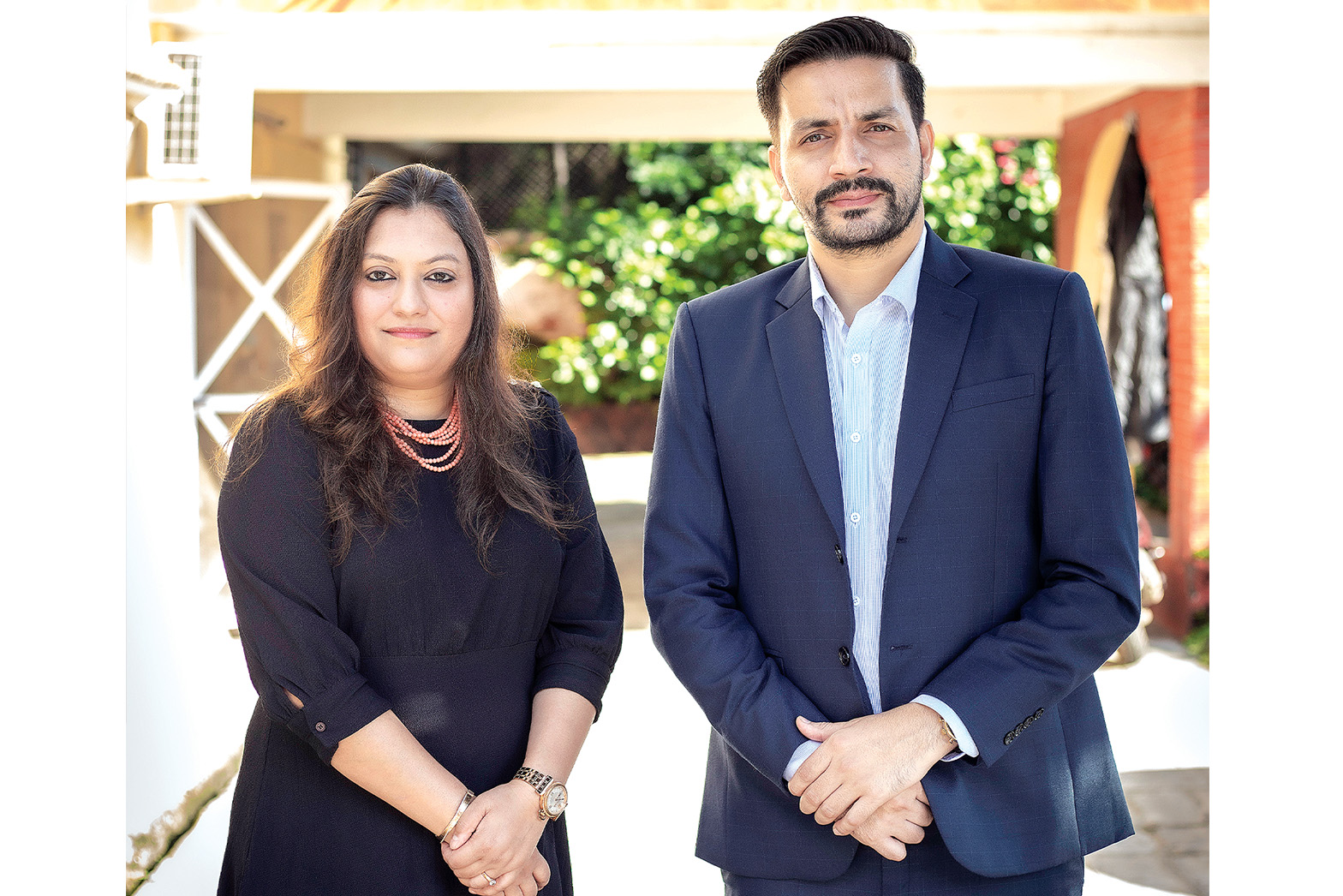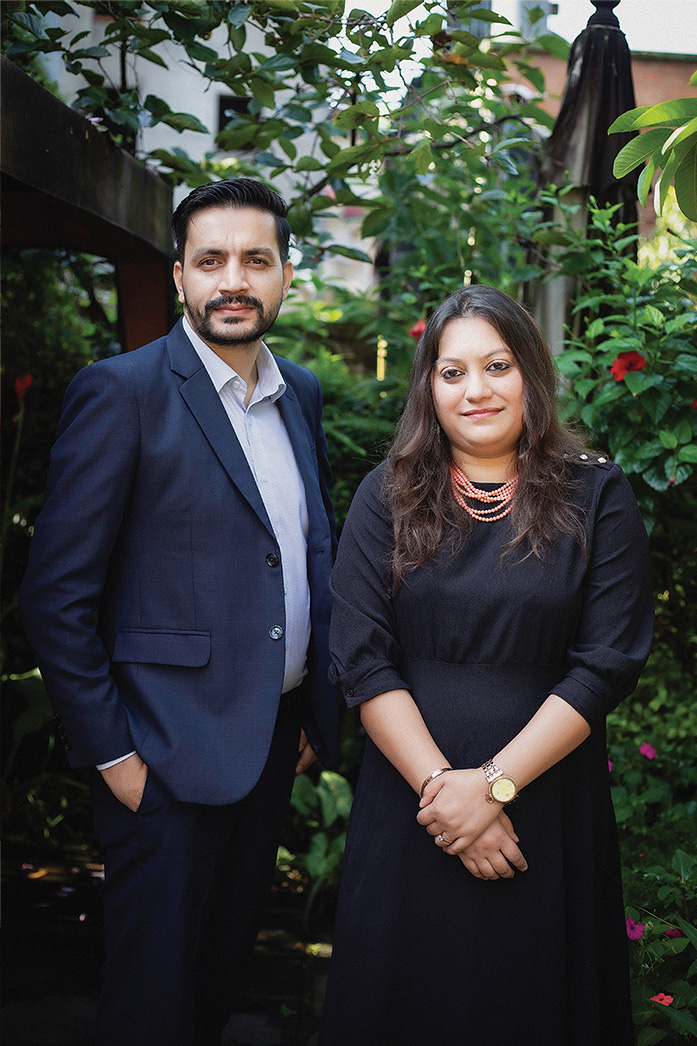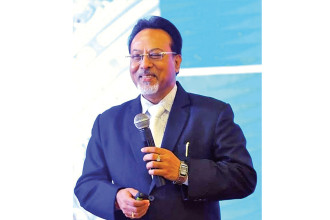
TULSI KHEMKA
Founder, Beyond Bookkeeping
BIDUR LUITEL
Partner, Joshi & Bhandary
Tulsi Khemka and Bidur Luitel represent two distinct yet complementary strands of leadership shaping Nepal’s financial and governance landscape. Khemka, a Chartered Accountant and transformation advisor with over 25 years of experience across India, Nepal and the Middle East, has partnered with more than 70 organisations to strengthen systems that build resilience. Her career, rooted in the belief that trust in processes must precede trust in numbers, led her to establish Beyond Bookkeeping, an initiative that reduces manual dependency, curbs fraud risks and creates stronger oversight. In Nepal, she has been a catalyst in reimagining internal audit as a tool for governance rather than a checklist, co-founding the Nepal chapter of The Institute of Internal Auditors (IIA) to align local practices with global standards and embed governance, risk and compliance into business DNA. For Khemka, auditors are not merely checkers but change makers who provide critical visibility in uncertain times.
Luitel, a Chartered Accountant with more than 15 years of practice, brings a different yet equally vital expertise in financial reporting, assurance and risk management. As a partner at Joshi & Bhandary, he has advised institutions across banking, insurance and corporate sectors, particularly in navigating Nepal Financial Reporting Standards (NFRS) and complex models such as Expected Credit Loss (ECL). His role in business revival, turnaround management and governance reforms has earned him recognition as one of Nepal’s foremost IFRS specialists. Currently serving as a government-nominated Board Member of the Accounting Standards Board, Nepal, and with qualifications that include a Diploma in IFRS from ACCA (UK) and certification in Forensic Accounting and Fraud Detection from ICAI, he continues to shape the country’s financial reporting landscape. His past contributions to ICAN’s committees on NFRS implementation, research and sustainability reflect his long-standing commitment to building transparency, trust and financial resilience.
Together, Khemka and Luitel highlight how financial systems, when guided by both process integrity and technical rigour, can strengthen organisations and economies. Their combined efforts underscore a shared vision: that robust governance, credible reporting and future-ready systems are essential to preventing crises and creating a fair, resilient and sustainable Nepal. In a conversation with Business 360, they shared these insights. Excerpts:
What inspired you and your colleagues to bring The Institute of Internal Auditors to Nepal?
Internal audit in Nepal has mostly been carried out at the transaction level rather than at the process design and overall GRC level. The inspiration came from this gap. Many professionals here are globally connected and have worked with international companies but the domestic market remained largely focused on transactional auditing.
This needed to change. We wanted to enhance overall standards and gain proper recognition for how audits are executed in Nepal. The goal was to put Nepal on the global map for quality auditing and professional service.

Why do you feel there was a necessity for establishing this institute at this time?
Nepal is at a crossroads. Our economy faces constant uncertainty but there is also strong hope for growth. Unfortunately, governance frameworks have not kept pace. We have seen how quickly trust can erode when systems fail and when governance and controls are not embedded into our DNA.
This is the right time to anchor a profession that ensures accountability and stability, not after another crisis but before the next one.
How do you see the institute helping to strengthen corporate governance and accountability in Nepal?
The institute is not merely a body of auditors, it is a safeguard for both businesses and government. By building skills, enforcing standards and creating dialogue, it will strengthen corporate governance at a time when Nepal urgently needs more transparent and accountable institutions.
What kind of role do you expect internal auditors to play in Nepal’s growing business and financial sector?
Internal auditors are not just ‘checkers,’ they are ‘change makers’. They act as advisors, risk managers and truth-tellers. In a dynamic market like Nepal, their role is to help businesses grow with confidence – spotting risks early, ensuring compliance and giving leadership clear visibility in uncertain times.
IIA Nepal is being set up under IIA India. At this stage, our objective is to build awareness, strengthen both the demand and supply side of the profession, and enhance the country’s capabilities. IIA India will provide us with technical know-how, global access to professionals, and knowledge workshops to get us started.
How can businesses, both large corporations and SMEs, benefit from having stronger internal audit systems in place?
For large corporations, stronger audit systems build investor trust, make access to capital easier, reduce costs, and accelerate decision-making. For SMEs, they bring discipline, minimise leakages and support scalability. In both cases, audits shift the mindset from firefighting to foresight.
How do you plan to build awareness among businesses in Nepal about the importance of internal auditing, given that many may still see it as a compliance formality?
Many still view internal audit as a box-ticking exercise mandated by the government or the board. We want to change that perception by demonstrating its value – how it protects against fraud, reduces costs and creates stability. Storytelling will play an important role. By sharing real examples from Nepal of businesses that survived or failed because of their systems, we can show the practical impact of strong auditing.
In your view, how can stronger internal audit practices contribute to reducing financial irregularities and improving investor confidence in Nepal?
Nepal’s market has often been shaken by financial irregularities and recurring civil unrest. Strong internal audits close loopholes before they can be exploited. That builds investor confidence, not only for foreign capital but also for local entrepreneurs who need a fair and level playing field.
How will the institute support professionals in terms of training, standards and certifications as well as for young professionals?
We will provide training, certification and mentoring pathways that connect Nepali auditors and the business community to global good practices. This is not just about improving technical skills, it is about belonging to a global profession that upholds trust everywhere.
IIA membership is open to anyone involved in internal audit – CFOs, CEOs or even those simply willing to learn.
For young people, this is an entry point into a global career while still serving their own country. Internal auditing is one of the few professions that allows you to create change from within – influencing leadership, shaping governance and leaving a legacy.
Globally, the CIA certification is a required qualification for anyone performing and signing off on internal audit reports. With IIA Nepal, young professionals now have access to that pathway.
How do you plan to align Nepal’s internal auditing practices with international standards?
Through IIA Global, Nepal now has direct access to the same standards used in Fortune 500 companies. This ensures that our professionals are
not isolated but are standing shoulder to shoulder with peers worldwide.
What challenges do you foresee in promoting internal auditing practices in Nepal, and how do you plan to address them?
The biggest challenge is mindset. Too often, leaders view auditing as interference instead of protection. Our approach will be to engage with them directly, make the business case for auditing, and highlight success stories where strong audits saved millions and protected reputations.
As professionals, our responsibility is to ensure our work is strong, impactful, transparent, trusted and accountable. For businesses, the goal is to protect themselves against chaos; and governance, risk management and internal audit form one of the key building blocks in this journey. In a country where governance gaps often make headlines, young professionals have the chance to be part of the solution – to help build a Nepal that is resilient, transparent and future-ready.
Nepal is at a crossroads. Our economy faces constant uncertainty but there is also strong hope for growth. Unfortunately, governance frameworks have not kept pace. We have seen how quickly trust can erode when systems fail and when governance and controls are not embedded into our DNA.
This is the right time to anchor a profession that ensures accountability and stability, not after another crisis but before the next one.






